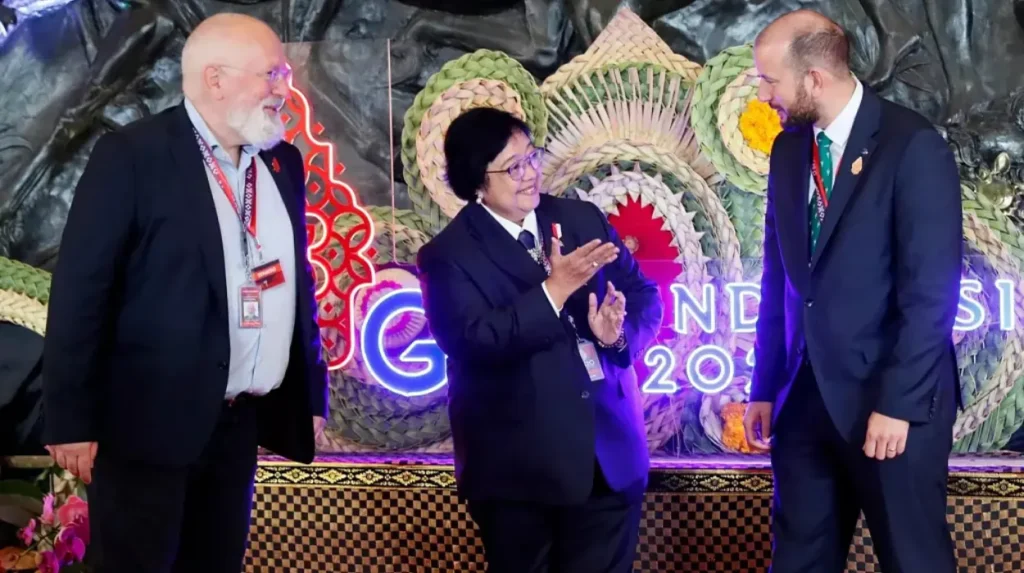A major controversy is sweeping the European Union after the European Taxpayers’ Association (Taxpayers Association of Europe, TAE) officially filed a criminal complaint against two former European Commissioners—Frans Timmermans and Virginijus Sinkevičius—over their roles in the allocation of billions of euros in funding to NGOs between 2019 and 2024. The complaint, submitted to authorities in Munich and the European Public Prosecutor’s Office in Luxembourg, has triggered heated debate over transparency, accountability, and the potential politicization of EU resources in support of policy goals. The allegations touch the heart of how European taxpayers’ money is managed and have reignited old disputes about the EU’s Green Deal and broader climate lobbying efforts.
The Core of the Allegations
At the center of the storm are former Executive Vice-President and Climate Commissioner Frans Timmermans, a chief architect of the European Green Deal, and Virginijus Sinkevičius, then Commissioner for Environment and Oceans, now a Green MEP. The TAE’s complaint asserts that over €7 billion in EU and member-state funds were funneled to non-governmental organizations (NGOs) during their tenures without adequate transparency, oversight, or compliance with EU policy objectives.
The four-page complaint, which references multiple media investigations and a critical report from the European Court of Auditors, accuses the ex-commissioners of presiding over
“non-transparent and possibly unlawful allocation of funds to NGOs.”
The NGOs allegedly used this money not just for environmental or social advocacy, but also for lobbying activity aimed at influencing the European Parliament, campaigning against certain trade policies such as the Mercosur deal (despite EU support for it), and even litigating against private European businesses. Some funds, the complaint further claims, were used to sway votes on sensitive policies—from pesticides to chemical regulation—directly impacting European industry.
Taxpayer Association’s Rationale
Michael Jäger, President of the TAE, set the case against a backdrop of “many disturbing media reports” on the Commission’s funding practices. He asserted:
“The allocation of public funds must be transparent and comprehensible.”
Jäger clarified that their goal was for prosecutors to determine whether
“European funds [were] used in ways that contradict European aims, and if such actions are illegal, then appropriate measures should be taken.”
He also cited growing concerns about whether the lobbying activities associated with the Commission could violate the separation of powers between EU institutions.
According to Jäger, the public and policy-makers deserve full clarity:
“We are also concerned with clarifying the general criminal liability of Commission officials for the EU’s budgetary assets. A legal vacuum must not arise. Because all Europeans are equal before the law,”
he stated.
Scope and Scale of the Funding
The most explosive claims hinge on the amount and destination of funds. Between 2019 and 2024, €4.8 billion was granted by the European Commission and a further €2.6 billion by member states, for a total exceeding €7 billion. The European Court of Auditors (ECA) issued a report in April that sharply criticized the Commission’s “opaque” practices and highlighted a lack of reliable information about how money was disbursed and spent by NGOs. Astonishingly, of more than 4,400 recipient NGOs, just 30 reportedly received over 40%—or €3.3 billion—of the allocated funds over a ten-year period.
The ECA further found that for the 2021–2023 window, over 90% of funding recipients—amounting to upwards of 70,000 organizations—were not clearly labeled as NGOs in official records, underscoring the EU’s inadequate oversight of its own criteria for NGO status.
Political and Media Reactions
The allegations land at a politically charged moment. Right-wing political groups in the European Parliament have for months demanded a deep investigation into how climate and activist NGOs are funded. Previous attempts to open a full parliamentary inquiry were rebuffed, but a working group under the Committee on Budgetary Control is now set to scrutinize these grants.
German newspaper Bild, as well as other continental media, suggest the funding may have supported lobbying efforts for the Green Deal, with some NGOs receiving secret payments to promote environmental legislation. The Commission, however, strongly denies the existence of secret subsidies, asserting that all its funding streams are transparent and claims of systematic lobbying support are unfounded.
Nick Aiossa, director of Transparency International EU, pushed back against the allegations, arguing:
“These are already debunked stories that were circulated in February. I simply don’t understand why the German press would jump on this, unless, of course, it has a more political agenda behind it from the people who are leaking the contracts.”
He maintains that previous reviews of the funding have not found systemic abuse.
The Offending Projects and Activities
Much of the disagreement revolves around how “influence” is measured when it comes to state funding for civil society and public advocacy. The TAE alleges that numerous grants were used by NGOs to wage campaigns against trade deals or promote Green Deal initiatives, thereby effectively lobbying lawmakers both in Brussels and in national capitals.
The most frequently cited example is money paid to environmental groups opposing the Mercosur trade agreement—sometimes directly at odds with Commission policy. Other targeted activities included funding for lawsuits challenging industrial operations, and for groups rallying MEPs ahead of significant votes on chemicals or pesticides.
Conversely, Commission sources argue that supporting civil society is both standard democratic practice and vital to the pluralism of policy development.
Legal Complexity and Next Steps
The TAE’s complaint, now reviewed by the Munich Public Prosecutor and the European Public Prosecutor’s Office, demands judicial clarification of criminal liability for Commission officials who oversee the EU budget. The organization argues that, should any laws have been violated, the legal process must now affirm whether this was the case and what sanctions apply.
It remains unclear how the case—should prosecutors pursue it—will proceed, and whether Timmermans, Sinkevičius, or other former officials will be formally investigated or charged. Both men are awaiting formal notice but have yet to comment publicly; neither was available for immediate comment as the story broke.
Broader Implications for the EU
This episode exposes deep divisions over EU governance and the scope of its climate and civil society policies. For critics, the case is emblematic of a European establishment allegedly pursuing its agenda with taxpayer resources, unchecked by robust scrutiny. For defenders, it is the latest in a series of politically motivated efforts to discredit vital public initiatives—especially the Green Deal—at a crucial moment for EU policymaking and climate action.
The case also raises larger questions about how the European Commission supervises the vast machinery of grants, subsidies, and contracts that form the backbone of its Green and social agendas. Previous audits have highlighted chronic under-resourcing and fragmentation in oversight—weak points now under sharp public scrutiny.
As the investigation unfolds, European institutions and the public are likely to face a protracted debate over the legitimacy, oversight, and accountability of EU funding for NGOs. Whether the TAE’s complaint yields criminal prosecutions or simply sparks new regulatory reforms, it is certain that the controversy will fuel calls for greater transparency and rigor in European budgetary practices.
The ultimate legacy of this case may well be decided not only in courtrooms but also at the next crossroads for EU environmental, fiscal, and political strategy.







